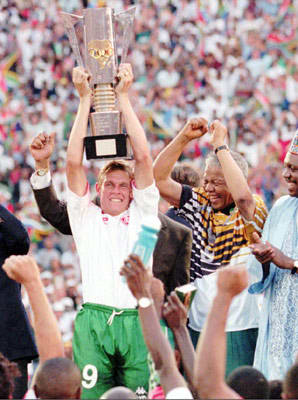The late Nelson Mandela understood the true power of sports
As the soccer became more competitive, disputes occurred. Everything, though, was done absolutely by the book. If players were disciplined, they would be granted the right to argue their case and then to appeal if the judgment went against them. "At the time in South Africa there was no due process," said Sedick Isaacs, another former prisoner who is now a professor of medicine at Cape Town University. "There was torture and coercion. This was a chance to show you could have due process and how it could work."

Mandela celebrates after handing the 1996 African Cup of Nations trophy to South African captain Neil Tovey.
AP
Mandela recognized that. It is to his credit, and that of the South Africa he tried to build, that the euphoric surge of patriotism was inspired not by conflict, but by the nation coming together over sports.





